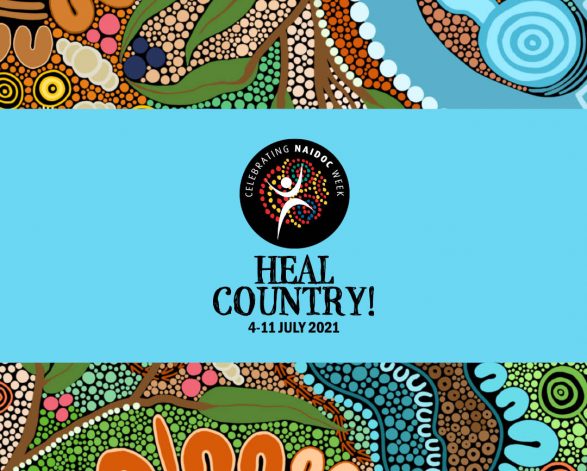It’s the start of 2021 NAIDOC Week with the theme 'Heal Country' which calls for stronger measures to recognise, protect, and maintain all aspects of Aboriginal and Torres Strait Islander culture and heritage.
On the 24 May 2020, Australia and the world were outraged at the destruction of 46,000 year old caves of cultural, ethnographical and archaeological significance at Juukan Gorge, WA. Sadly, the joint National Trust’s Federal Election Priorities for Heritage (issued one year prior to the destruction) noted that Indigenous cultural heritage continued to be at risk from incremental destruction and the cumulative impacts of large scale landscape change, that the EPBC Act had been progressively weakened and that this is putting Indigenous heritage at risk.
The most disturbing aspect of the destruction of these ancient caves by Rio Tinto was that it was technically legal, as the company received permission to conduct the blasts in 2013 under Section 18 of the WA Aboriginal Heritage Act. A government inquiry to investigate the destruction, which is still underway, importantly recognised the scope of the issue and has included in its Terms of Reference the investigation of the adequacy of state and Commonwealth heritage protection laws and the way they interact.
However, one year on from the destruction, an article in The Guardian noted that “the dust has settled to reveal that while Rio Tinto’s reputation is in pieces, the landscape of laws, policies and power imbalances is largely unchanged.”
In NSW, this is certainly still the case. NSW is the only state in Australia that does not have stand-alone Aboriginal cultural heritage legislation. Our state’s current Aboriginal cultural heritage laws (contained within the National Parks and Wildlife Act, 1974) are recognised as failing to protect aboriginal cultural heritage and being archaic for not providing a role for Aboriginal people in the self-determination of their heritage.
These Aboriginal heritage laws are underwhelming and flawed; worse still, their meagre protections can be ‘turned off’ for any development classified by the government as “State Significant”, an issue they share with the NSW Heritage Act (which protects non-Indigenous heritage places). State Significant Developments override existing environmental and heritage laws and operate outside their remit.
The failure of legislation to effectively protect Aboriginal heritage has driven a reform process to provide better protection for Indigenous heritage. However the Reform process, started in 2011, has been excruciatingly slow:
- In 2010 – bipartisan commitment made to review the Aboriginal Cultural heritage laws.
- In 2011 – NSW Government established an Aboriginal cultural heritage legislation reform working party to review the effectiveness of NSW Aboriginal heritage regimes.
- In 2013 – Draft reform Model and key proposals released.
- In 2013 – NSW Government’s response to the recommendations was released.
- In 2013 – NSW Government consultation on the proposed reforms.
- In late 2017 – NSW Government’s proposed new legal framework for Aboriginal cultural heritage is released for consultation.
- In February 2018 – NSW Government’s draft Aboriginal Cultural Heritage Bill released for public consultation.
- In December 2018 – NSW Government provided a summary of submissions report.
In 2021, eleven years after the bipartisan commitment to Aboriginal Cultural Heritage Reform, there has been no further progress and in the meantime, the destruction of Aboriginal sites continues.
Data released in the NSW Senates Committee (25 February 2021) shows that in the last five years, every single Aboriginal Heritage Impact Permit (AHIP – an application for a permit to destroy Aboriginal heritage) in NSW was approved. In the last year alone, there were 84 approved permits to destroy Aboriginal sites. The permits may come with “mitigation methods” to “minimise harm” however the cumulative impact on the state’s collective indigenous heritage is being mitigated away while we continue to wait for effective, robust, co-designed Aboriginal cultural heritage legislation.
Contrast this with the recent government announcement of a major Review of the NSW Heritage Act (which protects non-indigenous heritage places) at a time when the promise to enact independent Indigenous heritage legislation has not been fulfilled. Once again, the need to protect Aboriginal cultural heritage appears to have been sidelined.
It is NAIDOC Week and together with indigenous Australians, we worry about Country. The NAIDOC website despairs that:
“For generations Aboriginal and Torres Strait Islander people have been calling for stronger measures to recognise, protect, and maintain all aspects of their culture and heritage for all Australians.
Healing Country means embracing First Nation’s cultural knowledge and understanding of Country as part of Australia’s national heritage.
Destruction and desecration of our sacred lands or ancient sites – some of the oldest human occupation sites on the planet – is an enormous loss for both our nation and the world.”
The 2021 NAIDOC Theme of Healing Country asks:
“That the culture and values of Aboriginal peoples and Torres Strait Islanders are respected equally to and the cultures and values of all Australians. We are all looking for significant and lasting change.”
NAIDOC Week gives us the opportunity to reflect on these issues and their impact, and to consider how we can join our voice with others to bring about meaningful change. What can you do during NAIDOC Week to contribute to significant and lasting change? Here are some suggestions.
- Write to our NSW Premier and insist that the Aboriginal Cultural Heritage Reform process is made an urgent and fundamental priority of the NSW Government:Explain that not prioritising these reforms is resulting in continued and shameful destruction of Aboriginal heritage sites. Contact the Premier.
- Make a submission to the Independent Juukan Gorge destruction inquiry:
This inquiry’s scope includes looking into the effectiveness of heritage legislation across each state and territory of Australia, so your NSW experience and insight is useful.
Your submission can be detailed or it can simply explain your dismay at the loss of this site and the urgent need to ensure we have strong Aboriginal heritage protection across all levels of government. Make your submission.

 Twitter
Twitter Facebook
Facebook Linkedin
Linkedin Email
Email